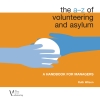‘Culture’ is a shared set of knowledge, beliefs, customs, morals and habits. Many of us are unaware of our culture, because we grow up in it and consider it normal – though if we are members of a minority group we may have been pushed into being culturally aware through being made to feel ‘different’. Within every society there are micro cultures: families, religious groups, social groups and different places and types of work all have their own cultures to some extent.
It is both enriching and beneficial to learn about different cultures. Volunteer managers can work to help staff and volunteers be aware of both their own and other people’s cultures – this can also help if friction occurs because of different cultural norms or because of misunderstanding. It is also important to remember that people brought up within the same culture may perceive that culture differently. No culture is static, all cultures change, and cultural identity is only one of the many influences that make us who we are. For instance, our ethnicity, immigration personal philosophy are all part of our make up, and some of these may mean more to us than culture.
So while learning about culture is important, it is equally important to avoid stereotyping. Alongside giving staff and volunteers information about particular cultures or nations, you need to help them build up self-awareness and the skills to ask the right questions, to listen well, and to be sensitive when working with people from different backgrounds.
Checklist - Cultural Awareness
- be aware of your own cultural assumptions and how these may affect your understanding and responses
- listen with respect and a genuine wish to learn
- find out how people see themselves and their culture, what they value, what they see as important
- beware of negative or pejorative ‘information’ – it usually indicates prejudice or incomplete understanding
- understand that in discussing culture we are discussing possibilities, not certainties – a framework, not a straitjacket
- be prepared to change your understanding as new information becomes available
- sort out what information is useful and helpful to your work, and what is merely exotic or personally fascinating
- understand the importance of factors such as age, generation, life experience, occupation, education and so on
- realise that culture is one factor, but not the only factor in anybody’s life remember that the person you are working with is always the expert on their
- own life, wishes and needs
(Schott and Henley, 1996)
For more information For information on countries that asylum seekers come from, visit the website of Human Rights Watch: www.hrw.org. The website of the UN High Commissioner for Refugees also has information about refugee movements (www.unhcr.ch).

